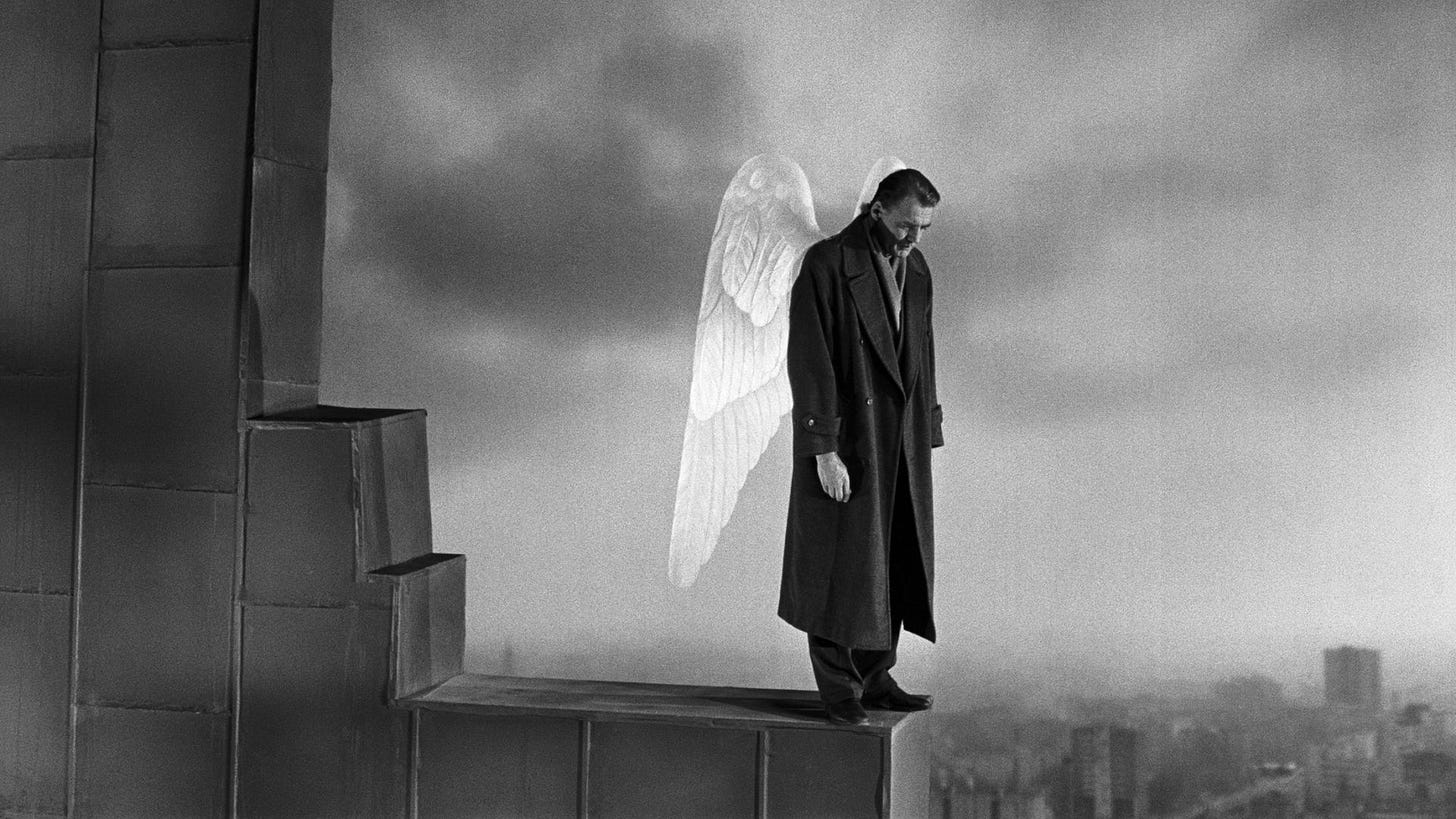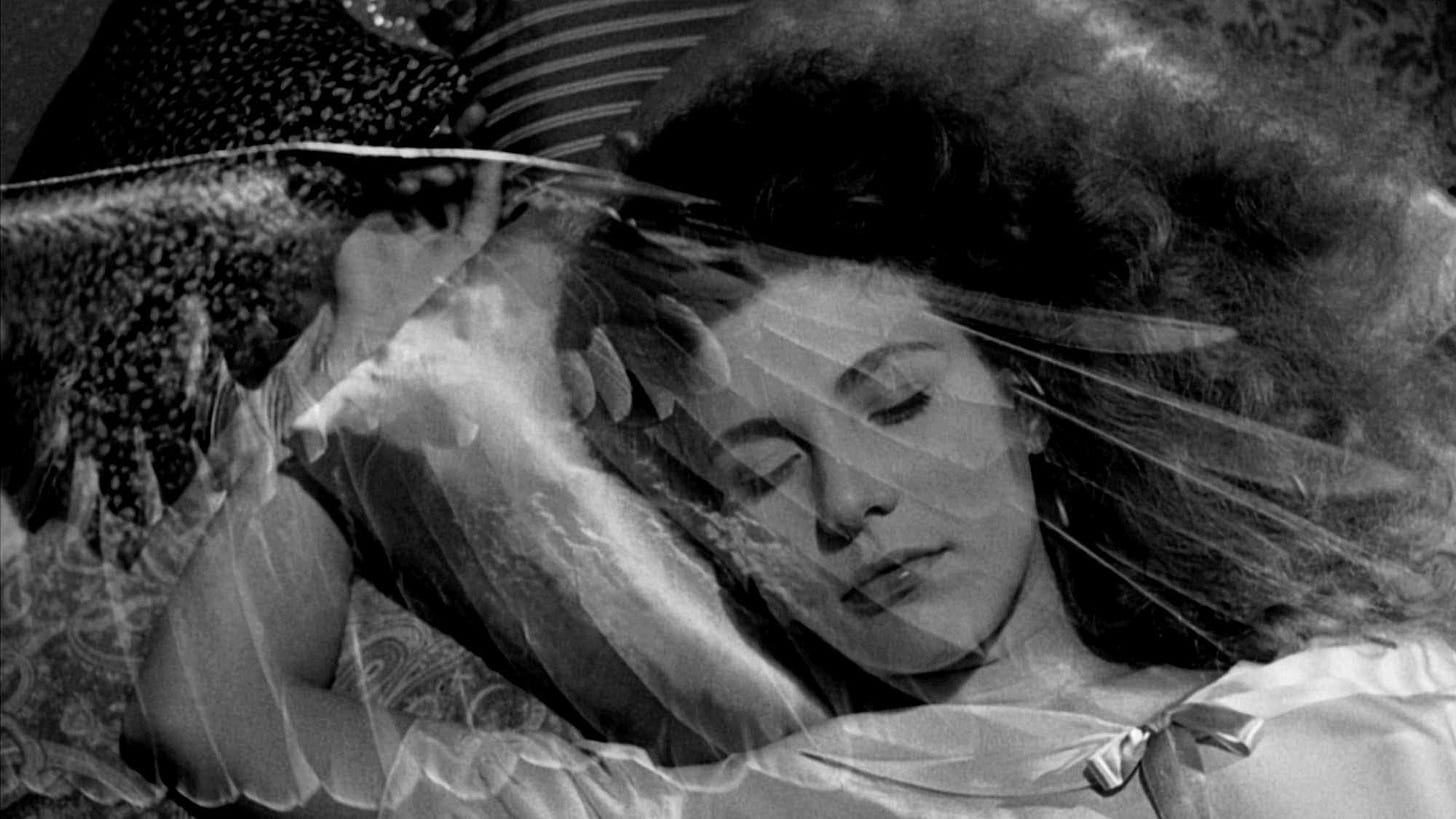Sunday Sermon #1 — Spirituality as escapism
Can you accept your humanness when it would be so much easier to disconnect and dissociate?
Stills from “Wings of Desire” (1987)
Sunday Sermons are short essays on spirituality, delivered to your inbox every first Sunday of the month.
Imagine a reality in which you are never truly alone. You never have been, never will be. Even during those times in your life when all hope has been lost, when you start to consider that “things” have never been this bad, that if you make it out mentally intact, it’ll be a wonder. Especially in those times, something invisible to you is present. Those darkest moments are when miraculous forces draw closest to you and want to comfort you.
That is the premise of Wings of Desire, a Wim Wenders film I watched at home alone last weekend. The film is set in a still-divided greyscale Berlin, where everyday people suffer in a bleak ambient sense because this is life we’re talking about. Angels exist too. They observe humans as they stroll around the city; sometimes they intervene and offer comfort, which people can feel and react to—they almost immediately brighten. Occasionally angel presence is futile and the decision to end a life has already been made.
Wenders wanted to be a Catholic priest when he was a teenager but instead grew up to make Paris, Texas and have five wives, which tells you everything you need to know about Wings of Desire: these are melancholic times in a post-religious landscape but make it hopeful, make it ever-reaching for a woman’s warm hand.
It seems like these angels have the ideal existence: everlasting life, psychic and emotional peace and a sense of purpose (help silly humans). But one of them—a male angel called Damiel—starts to feel the hum of discontentment. There’s a beautiful conversation between him and his fellow angelic colleague in which he expresses this disturbance. “It’s wonderful to live as a spirit and witness for all eternity strictly what’s spiritual about people. But sometimes I get fed up with my transcendental existence,” he says. “I don’t want to always hover above. I’d rather feel a weight within that would end this boundlessness and tie me to the earth. At every step, or every gust of wind, I’d like to be able to say ‘now’ and ‘now’ and ‘now’...”
The monologue goes on as he runs through all the ordinary but remarkable things about being a human. “To lie!” he smiles. “Through one’s teeth. To feel your bones as you walk along! Let things dawn on you, not always know it all!”
It’s one of the greatest scenes of a film I’ve ever seen. It insists that this paradox of possessing knowledge about life without full embodied participation in all its highs and lows, would only lead to yearning of a different kind. Mere detachment or spiritual macro observation would never be enough. To live, with all our frustrating fucking limitations, has to be done through engaging with the world. We are not here to be angels, neither should we want to be.
It’s something I used to think about so much in my 20s: being human is lonely and confusing, I want to transcend whatever this is. I want to be so big and dense that I no longer have these alarming cyclical thoughts and compulsions. I want to transform into a female Ram Dass-Jesus hybrid who doesn’t feel biologically traumatised on a cellular level. I don’t even want to feel fleeting joy; it’s not worth the rest of the rollercoaster. It’s not quite suicidality but it can taste like a similar flavour, maybe it’s closer to a quasi-spiritual crisis. And anyway, isn’t that what secular religion tells you? Be more like God?
I recognise it as the process at play behind addiction: whether it’s an addiction to shopping or drugs or people. Escape, escape, escape: it’s the drive that takes you into the void in a multitude of ways. You feel pain, you feel malaise, you feel...your desire to alleviate your humanness, and then you’ve phoned it in at work, told yourself the next job will be the real one, snapped at your partner, ignored your friends, eaten and drank what you shouldn’t, scrolled on social media until you got numb enough to find yourself lying in bed at night wondering why everything feels so bad.
But there’s so much of this drive in mainstream spiritual culture now. To rise above others, to obliterate the ego with plant medicine or denial, discount the circumstances that individuals are handed in life, and ignore the suffering that is happening in the world. I listened to a podcast episode recently where two women were in conversation—one was a spiritual influencer (whose content I liked until she freebased loads of frog venom and started talking about her womb in the third person as a separate female entity) and the other worked in wellness and had experienced so many ego deaths she sounded like AI. They were deep enough in the sauce that they were not angels but seemed to me to exist in a dimension where angels fear to tread. Then I saw another big relationships coach talk online about what he’d learned of connection from his many, many ayahuasca trips, which is great and all, to see from that great height, but what about granular, hard-won learnings through the grind of trying and failing to be intimate with the people in front of you? What about what it’s like down here in the trenches?
It was my birthday this week and I’ve been reflecting on what the age of 33 means to me. I’m not where I thought I’d be by now but then I don’t know what I expected. I didn’t conceive of ever being this age, so I didn’t sensibly plan or imagine routes and possibilities, which I suppose is a symptom of spending my 20s in the state I’ve described. Somewhat ironically, by passing through human time, I’ve reached my Jesus Year. It’s supposed to be a year of death and rebirth. I welcome that, honestly.
I welcome the death of whatever is in me or around me that wants to go. I want some subtle ascension in how I manage my emotions and relationships. But I don’t want to be an angel anymore—I know that’s not what I’m here to be. There is a spiritual game at hand and I have to be tied to the earth to play it. Wishing it any other way is an impotent use of time. If I listen and look carefully enough I see that the invisible forces around us place clues, messages and people in the way to guide me further through the game. I feel Wings of Desire was placed in my orbit so that I would watch it exactly now and root deeper down into mundanity.
When Wenders started making the completely unscripted Wings of Desire (even the voiceover is improvised), angels were strictly his metaphor for the “better souls” we each have inside us. Yet as the filmmaking went on, he realised he had fully evoked these angels and his own relationship with them had changed. In an interview with the BFI, he declines to elaborate on that relationship because it’s too personal but I reckon he believes he had sustained and tangible contact with them.
“A metaphor remains a metaphor but in the course of making the film the angels became serious entities for us. The camera had to learn how to look lovingly at people,” he said. When Wenders first told his cameraman this information, the man looked back at him blankly and said, how? What do you want me to do? “We can all do it,” Wenders explained. “We just have to make an effort with each shot. We have to translate the look of the angels.”
How can you see through the eyes of angels this month? Where can you spot opportunities to find merit in your suffering? Can you accept your humanness when it would be so much easier to disconnect and dissociate?
§
Notes on my September, wellness, work, etc:
Recently I’ve been experimenting with different forms of exercise to find something that clicks and is complementary to weight-training. (I like lifting weights because they get me into my body and satisfy the mental grooves of my OCD: lift something up, put it back down, track progress in notes on phone, feel robotic and organised.) I went full Jia Tolentino and attended a reformer pilates class at Heartcore. It was more challenging than I’d expected it to be, given that the women who get contentified for promo make it look like they’re just gorgeous gorgeous girlies messing around on little machines. I enjoyed it though—it felt like I was a pig on a spit, splitting open with the heat, which is to say I hurt for days afterwards in little strips of my body I didn’t know existed, and will be incorporating it into my monthly exercise routine.
Alongside that, I’ve bored myself checking the ingredients of what I’m using on my skin. I got rosacea about a year ago, which is getting worse, so I can’t throw just anything on it anymore. A favourite ~discovery has been Wildsmith Skin, a natural botanical British skin brand. My face tolerates their gloopy cleansers (the earthy but aquatic smells that you can’t quite place are addictive in a weird ‘I inhaled this often when I was the original woman living blissfully in the Garden of Eden but have since been robbed of all memory’ way) but I especially love the hand/body cleanser and body oil, which are basically a softer and superior alternative to Aesop and Cowshed products.
For those interested, I’ve not been writing a lot recently (apparently no one likes reading articles anymore?) but I did write an opinion piece for the Guardian on how the energetics of fandom are changing and what that might mean. I’ve got more opinions on that but they start to get pretty hit blunt and talk woo, so maybe I’ll get into it later on a more depraved platform than a national newspaper’s website.







I think I may be requiring my composition students to read your sermons. We're doing a block schedule--three hours a day, Monday through Friday, for 18 days--so I don't start with it until mid-November--and I think these would be ideal for weekly discussion: not just the writing, but the subject matter. Ummmm, don't worry: I believe you have done more than your Zoom duty for my classes! You have been so generous with your time, and my students have certainly profited from that! Keep up the good work, Hannah!